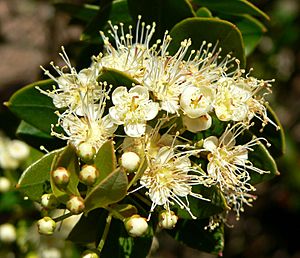Amomyrtus meli facts for kids
Quick facts for kids Meli |
|
|---|---|
 |
|
| Conservation status | |
| Scientific classification |
|
| Kingdom: | Plantae |
| Clade: | Tracheophytes |
| Clade: | Angiosperms |
| Clade: | Eudicots |
| Clade: | Rosids |
| Order: | Myrtales |
| Family: | Myrtaceae |
| Genus: | Amomyrtus |
| Species: |
A. meli
|
| Binomial name | |
| Amomyrtus meli (Phil.) D.Legrand & Kausel
|
|
| Script error: The function "autoWithCaption" does not exist. | |
Script error: No such module "Check for conflicting parameters".
The Meli (scientific name: Amomyrtus meli) is a special type of tree found only in Chile, a country in South America. It belongs to the Myrtaceae family, which also includes plants like eucalyptus and myrtle. This beautiful evergreen tree grows in moist, shady places from Arauco to Chiloe, which is in the southern part of Chile.
Contents
What the Meli Tree Looks Like
The Meli tree is an evergreen tree, meaning it keeps its leaves all year round. It can grow very tall, up to 20 meters (about 65 feet). The trunk can be as wide as 60 centimeters (about 23 inches).
Its bark is smooth and has a reddish-whitish color. The bark peels off in pieces, which is a unique feature.
Meli Leaves and Flowers
The leaves of the Meli tree grow in pairs opposite each other. They are oval or shaped like a spear. Each leaf has a pointed tip. They are usually 2 to 5 centimeters long and 0.7 to 2.5 centimeters wide.
New shoots on the Meli tree are smooth. This helps tell it apart from a similar tree called Amomyrtus luma.
The Meli tree has white flowers that are about 3 to 4 millimeters long. Each flower has five sepals (small leaf-like parts that protect the bud) that are joined together. It also has five free petals. These flowers have many stamens (the parts that produce pollen), usually between 40 and 80 of them.
Meli Fruit
After the flowers, the Meli tree produces a small, round fruit. This fruit is a purplish-black berry. It is about 5 to 8 millimeters wide. Each berry usually contains three seeds inside.
Where the Name Meli Comes From
The scientific name Amomyrtus meli has an interesting meaning. The first part, Amomyrtus, comes from Greek words. Amos means "very fragrant," and Myrtus is the name of the plant family it belongs to. The second part, Meli, is the original name for this tree in the Mapudungun language. This language is spoken by the Mapuche people, who are native to Chile.
Meli Tree History
The Meli tree was first described by a scientist named Rodolfo Amando Philippi in 1856. Later, in 1947, two other scientists, D.Legrand and Kausel, further classified it.
How People Use the Meli Tree
The wood from the Meli tree is very strong and tough. Because of this, it is often used to make handles for tools.
People also plant the Meli tree as an ornamental tree in gardens and parks. It is popular because it blooms with many beautiful, fragrant flowers. These flowers are also very important for making honey, as bees love to visit them.
See also
 In Spanish: Melí para niños
In Spanish: Melí para niños
 | Isaac Myers |
 | D. Hamilton Jackson |
 | A. Philip Randolph |


